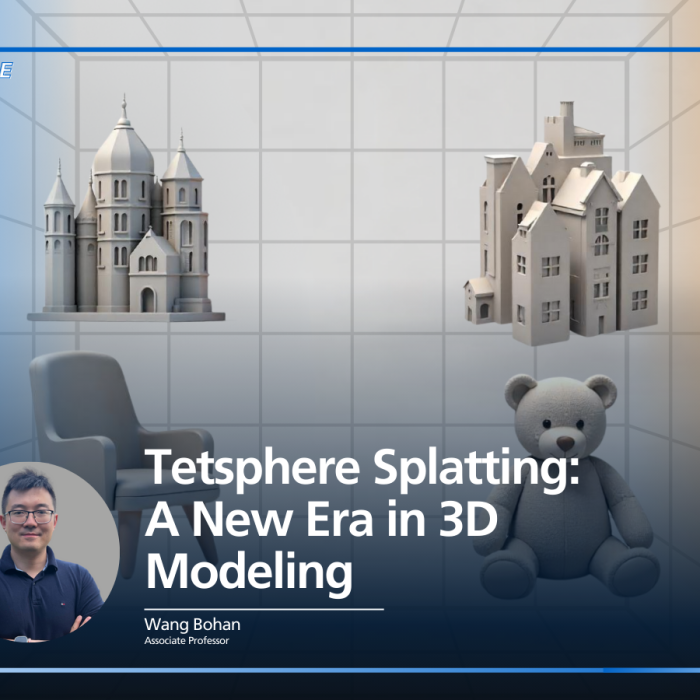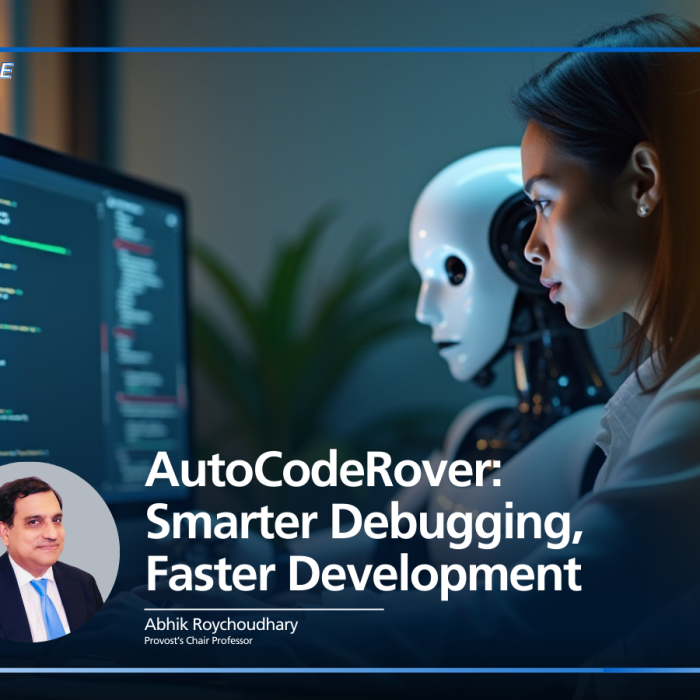Bytes

Best Paper Award at MMSys 2025
Congratulations to NUS Computing’s Associate Professor Ooi Wei Tsang and PhD student Shi Yuang on receiving the Best Paper Award at the 2025 ACM Multimedia Systems Conference (MMSys), held in Stellenbosch, South Africa!
Their paper, “LTS: A DASH Streaming System for Dynamic Multi-Layer 3D Gaussian Splatting Scenes,” presents a new approach to streaming immersive, interactive 3D content with greater efficiency—even over regular internet connections.
This recognition highlights their impactful contributions to multimedia systems research and reflects NUS Computing’s leadership in pushing the boundaries of digital innovation.
We are proud of their achievements and the global collaborations that made this work possible.
#NUSComputing #ACMMMSys2025 #BestPaperAward #3DStreaming #MultimediaSystems #ResearchExcellence
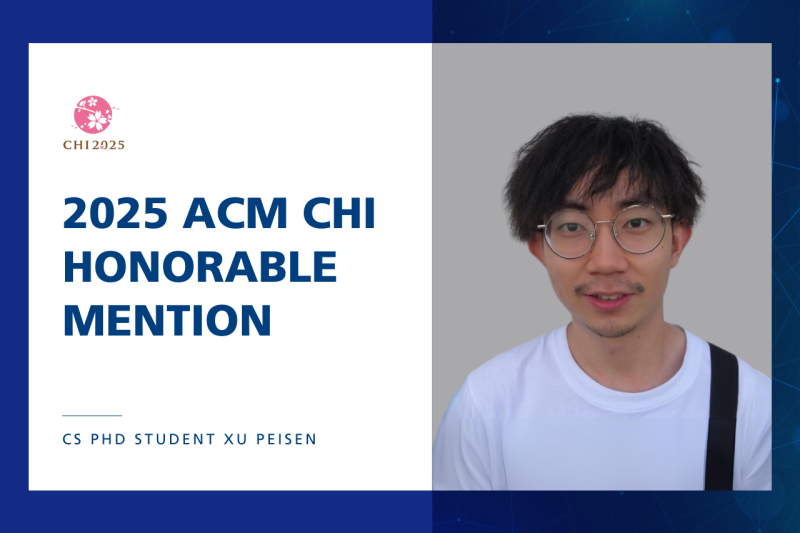
PhD Student Xu Peisen Receives Honorable Mention at CHI 2025
CS PhD student Xu Peisen has received Honorable Mention at CHI 2025, placing his paper among the top 5% of submissions at this premier conference in human-computer interaction.
His research, conducted under the guidance of Assoc Prof Ooi Wei Tsang (NUS) and in collaboration with Jérémie Garcia and Christophe Jouffrais (Université de Toulouse), is part of the IPAL/DesCartes program, a French-Singaporean initiative driving global research excellence.
This recognition underscores the strength of international collaboration in advancing HCI research. Congratulations to Peisen and the team! 🎉
#NUSComputing #CHI2025 #ResearchExcellence
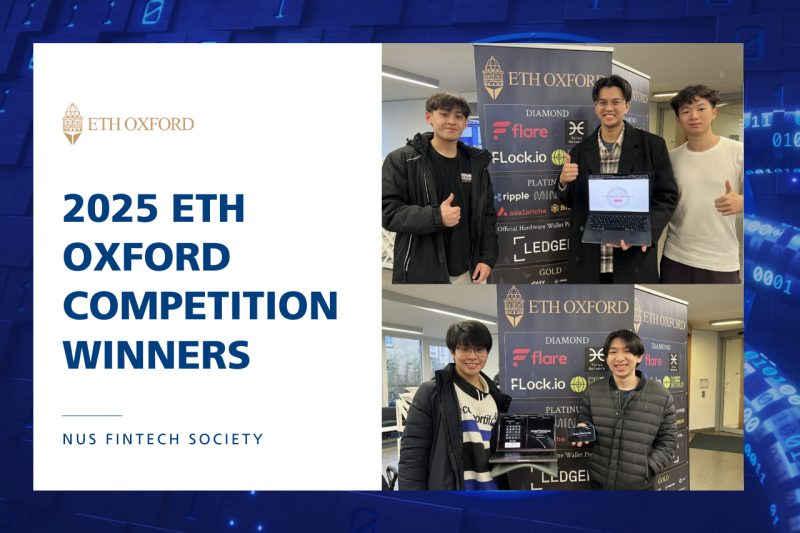
NUS FinTech Society Secures Multi-Track First-Place Awards at ETH Oxford 2025
Congratulations to the NUS FinTech Society (FTS) Blockchain team on their remarkable success at the ETH Oxford Competition 2025! The team secured three 1st place awards across multiple tracks, demonstrating their expertise and innovative approach in the field of blockchain technology.
🚀 FlareGate by Jerial Chan Zhi Yang, Jefferson Lee Chun Yin, and Kevin Lim Teng Hong: 1st place in both the Main Track (Consumer) and Flare Track.
💡 Guess the Human by Chua Wei Rong (NUS) and Jason Chai Jian Hao (University of Bristol): 1st place in the AirDAO Track.
🚀 Mina Verify by Marcus: 1st place in the Mina Track.
These achievements reflect the team's dedication to advancing the application of blockchain technology in real-world scenarios. Their innovative projects are a clear example of how the next generation of leaders is shaping the future of decentralized systems and digital finance.
#NUSComputing #ETHOxford #BlockchainInnovation #FinTech #Cryptocurrency #DecentralizedFinance #TechLeadership #Innovation
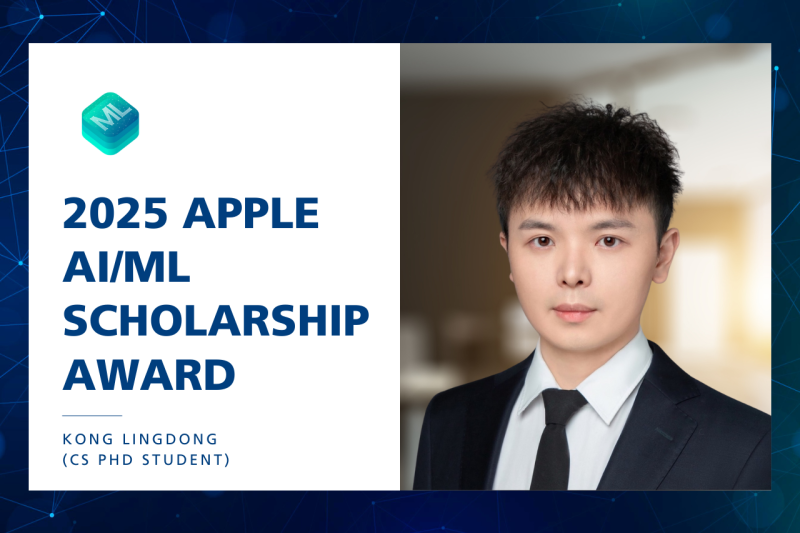
PhD Student Kong Lingdong Receives 2025 Apple AI/ML Scholarship Award
Kong Lingdong, our CS PhD student, has been awarded the 2025 Apple AI/ML Scholarship.
The Apple Scholars in AI/ML PhD fellowship program recognizes outstanding PhD students for their contributions to artificial intelligence and machine learning. Scholars are selected based on their research, leadership, and commitment to advancing the field.
Lingdong, advised by Associate Professor Ooi Wei Tsang, focuses on cutting-edge AI/ML research. As a recipient, he will receive financial support, mentorship from Apple researchers, and internship opportunities to further his work.
#NUSComputing #AppleScholars #AIResearch #MachineLearning #PhD
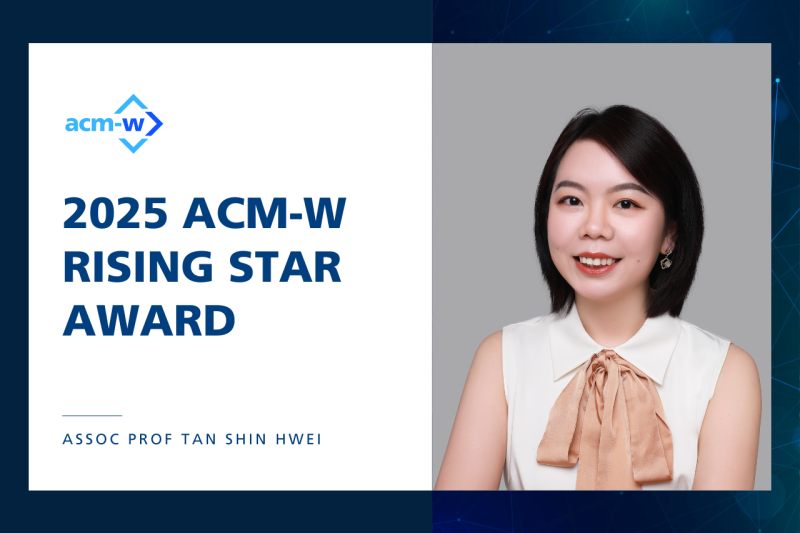
Prof. Tan Shin Hwei (CS PhD Alumna) Receives 2025 ACM-W Rising Star Award
Congratulations to NUS Computing alumna Tan Shin Hwei (PhD CS, Class of 2018) on being awarded the 2025 ACM-W Rising Star Award!
This distinguished recognition highlights her significant early-career contributions to computing research and her commitment to fostering diversity and inclusion within the tech industry. Currently an Associate Professor at Concordia University, Shin Hwei continues to drive impactful research while advocating for increased representation of women in technology.
We are proud to celebrate her outstanding achievements and look forward to her ongoing contributions in shaping a more inclusive and innovative future in computing.
#NUSComputing #WomenInTech
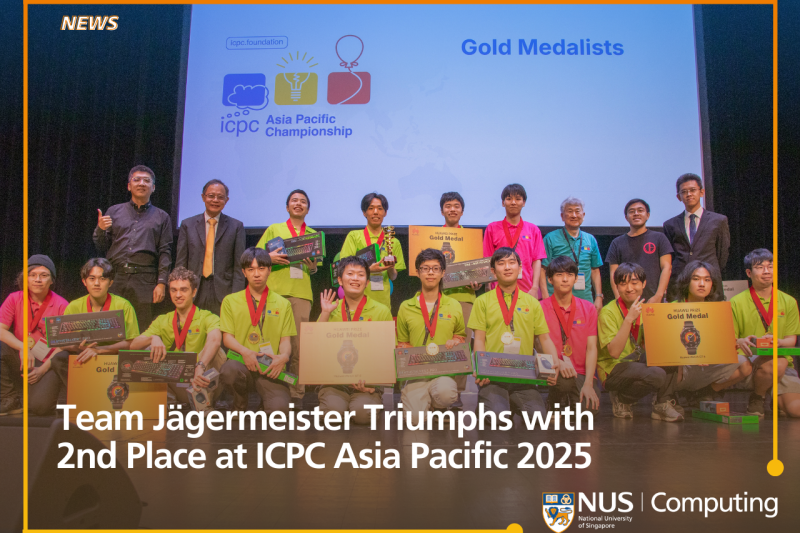
Team Jägermeister Takes 2nd Place and Advances to World Finals
Team Jägermeister Takes 2nd Place at ICPC Asia Pacific 2025 Hosted at NUS Computing and Advances to World Finals
The ICPC Asia Pacific Championship 2025, hosted by NUS School of Computing’s CeNCE, gathered 65 elite teams from 40 universities across 8 countries for an intense onsite competition at UCC. With 280 participants, the event highlighted the region’s brightest minds in algorithmic problem-solving.
🏆 NUS Team Jägermeister secured 2nd place! They solved 10 problems, tying with the champions, the University of Tokyo’s Team Screenwalkers. No other team solved more than 8, marking a strong performance. This result earned them a spot at the 2025 ICPC World Finals in Baku, Azerbaijan (31 Aug – 5 Sep 2025).
- Check out the full scoreboard: icpcapac.firebaseapp.com/standings
- Learn more about the event: apac.icpc.global
Congrats to Team Jägermeister and all teams for their dedication and impressive performances!
#ICPC2025 #NUSComputing #CompetitiveProgramming #ProblemSolving #TechExcellence
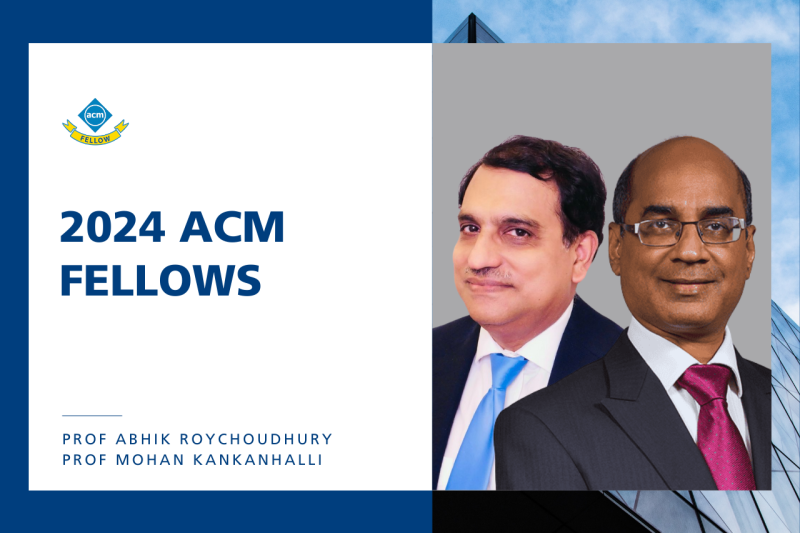
2024 ACM Fellows
Congratulations to NUS Computing Professor Mohan Kankanhalli and Professor Abhik Roychoudhury on being named 2024 ACM Fellows!
This distinguished recognition celebrates their transformative contributions to computing science and technology. Professors Kankanhalli and Roychoudhury continue to drive impactful advancements in the field, solidifying NUS Computing’s global leadership in innovation and research.
We are proud of their remarkable achievements and look forward to their ongoing contributions to the world of computing.
#NUSComputing
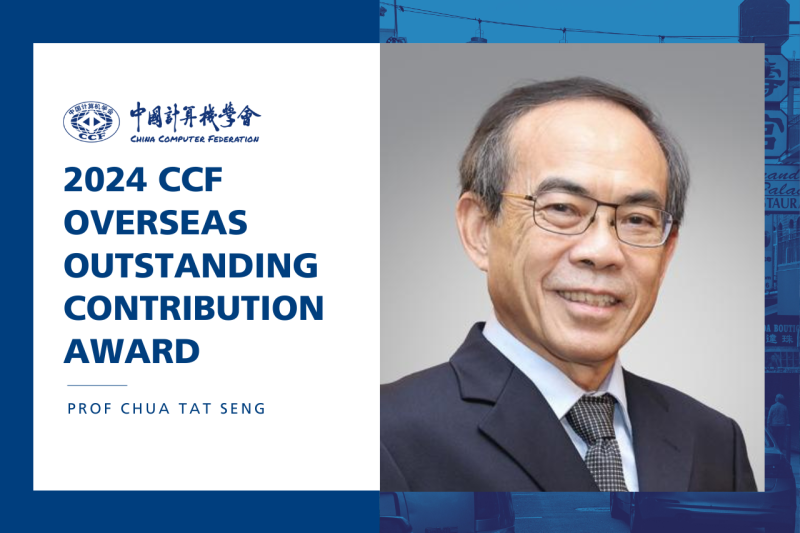
CCF Overseas Outstanding Contribution Award 2024
Congratulations to KITHCT Chair Professor Chua Tat Seng on being awarded the prestigious 2024 CCF Overseas Outstanding Contribution Award by the China Computer Federation (CCF).
This highly selective award is presented annually to 1-2 overseas individuals or organizations in recognition of their exceptional contributions to advancing China’s computer industry. The award highlights achievements in areas such as scientific research, academic collaboration, talent development, and international cooperation.
Professor Chua’s dedication to advancing computer science and fostering collaboration between global and Chinese academic communities has left a significant impact on the field. His work exemplifies the importance of building bridges through research and education to drive innovation.
We are proud to celebrate this remarkable recognition of his contributions to computer science and the global computing community.
#NUSComputing
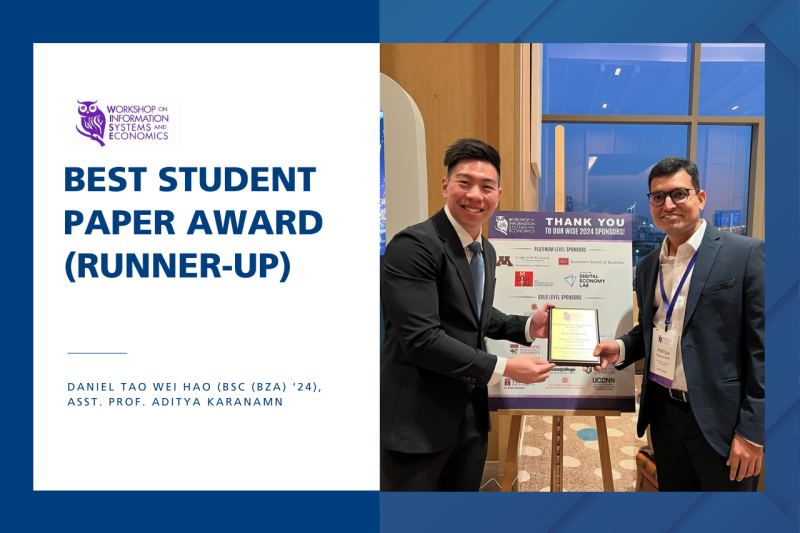
Best Student Paper Award WISE 2024
Congratulations to our alumnus Daniel Tao Wei Hao (BSc BZA, Class of 2024) and his Final Year Project advisor, Assistant Professor Aditya Karanam, for being awarded Runner-up for the Best Student Paper Award at the 2024 Workshop on Information Systems and Economics (WISE) in Bangkok, Thailand.
Their paper, “AI Algorithms and Collusion in Ad Auctions,” examines the role of AI in shaping advertising markets, offering valuable insights into algorithmic strategies. Developed as part of Daniel’s Final Year Project, the research reflects a commendable collaboration between NUS Computing and leading international scholars.
Daniel, who recently joined Morgan Stanley, continues to excel and make us proud with his accomplishments in AI and analytics.
#NUSComputing #ArtificialIntelligence #Research
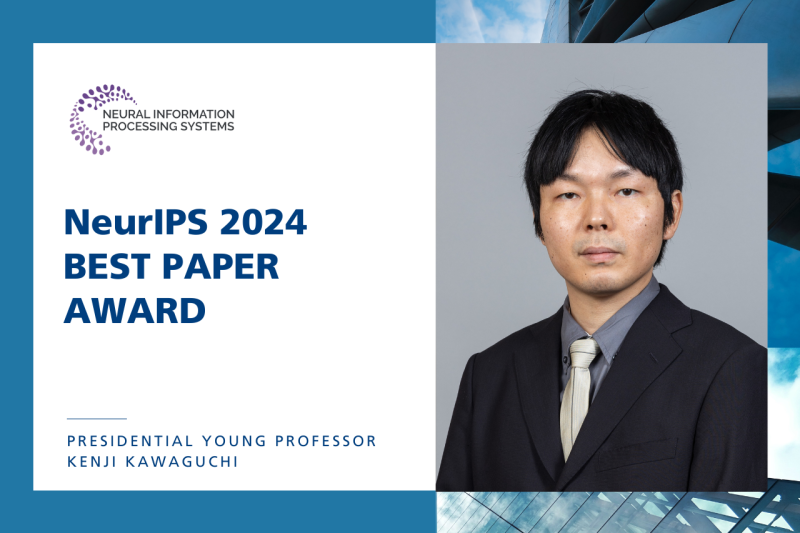
Best Paper Award at NeurIPS 2024
We are thrilled to share that NUS Computing’s Presidential Young Professor Kenji Kawaguchi has been awarded the Best Paper Award at NeurIPS 2024, one of the world’s premier AI conferences!
Presidential Young Professor Kenji Kawaguchi’s paper, “Stochastic Taylor Derivative Estimator: Efficient Amortization for Arbitrary Differential Operators,” with NUS PhD students Shi Zekun and Hu Zheyuan and collaborator Lin Min from Sea AI Lab, tackles a critical challenge in AI and computational mathematics—efficient computation of derivatives for complex systems. Their innovative approach provides efficient amortization, enabling faster and more accurate computation of derivatives across a wide range of applications.
This achievement highlights the significance of Kenji Kawaguchi’s contribution to both theoretical and practical advancements in AI. His work not only addresses computational efficiency but also opens doors for applying these methods to more complex problems in optimization, control systems, and beyond.
NeurIPS 2024 (10–15 December) brings together researchers and practitioners from across the globe, with the Best Paper Award being one of its most prestigious honours. Kenji Kawaguchi’s recognition is a proud moment for NUS School of Computing and underscores our commitment to advancing impactful research in AI.
To learn more about the award, visit: NeurIPS Best Paper Awards.
Congratulations to Kenji on this well-deserved recognition!
#NUSComputing
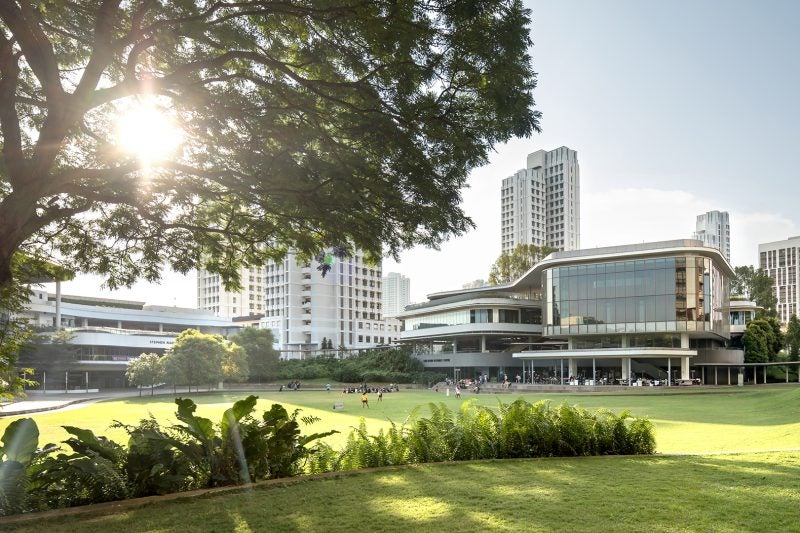
Termination of co-operation with Beijing Zhongxin
The National University of Singapore (NUS), including its Schools, has ceased co-operation with Beijing Zhongxin Enterprise Service Education Technology Co. Ltd (北京中新企服教育科技有限公司, “Beijing Zhongxin”) and Ms. Rain Wu Xiaoyu (武晓宇女士) on any programme after 13 September 2024 and has taken steps to terminate all dealings with Beijing Zhongxin and Ms. Rain Wu Xiaoyu.
Beijing Zhongxin, Ms. Rain Wu Xiaoyu, Jiayi Education Technology (Beijing) Co Ltd (Empowerment Institute) (加一教育科技(北京)有限公司), Time International Education Technology (Beijing) Co Ltd(时代慧智国际教育科技(北京)有限公司), Jiayi Digital Technology (Beijing) Co Ltd (加一数字科技(北京)有限公司)and/or any of their respective related entities, representatives, or agents (collectively referred to as the “Entities”), are not authorised in any capacity to represent, bind and/or act on behalf of NUS in relation to any marketing, recruitment or any activities including but not limited to collection of fees in relation to any programmes or activities of NUS.
Any unauthorised use of the NUS brand, logo and related materials for promotional purposes by the Entities is strictly prohibited. The publication or dissemination of any content or text that could potentially mislead the public or create any ambiguity in relation to NUS and its Schools is strictly prohibited.
Please get in touch with us at: nuscet@nus.edu.sg should you have any queries or have been approached by Beijing Zhongxin, Ms. Rain Wu Xiaoyu and/or any of their representatives or agents in relation to any programmes or activities of NUS.
全面终止与北京中新企服教育科技有限公司的合作
新加坡国立大学及下设各学院自2024年9月13日起,已终止与北京中新企服教育科技有限公司(“北京中新”)及武晓宇女士关于课程项目的合作,并已采取措施终止与北京中新以及武晓宇女士的所有业务往来。
北京中新企服教育科技有限公司、武晓宇女士、加一教育科技(北京)有限公司、时代慧智国际教育科技(北京)有限公司、加一数字科技(北京)有限公司或其任何相关实体、代表或代理机构(人),均无权代表新加坡国立大学进行任何形式的营销、招生或其他活动,也无权进行任何活动相关的费用收取等操作,相关项目包括但不限于全球CEO课程或新加坡国立大学的任何课程项目。
任何未经授权使用新加坡国立大学品牌、标识及相关材料进行宣传的行为,均被严格禁止。严禁发布或传播任何相关新加坡国立大学及其学院的,可能误导公众或引发歧义的内容或文本。
如果北京中新、武晓宇女士或其代表或代理机构以新加坡国立大学任何课程项目以及相关活动的名义与您联系, 请通过电邮与我们取得联络: nuscet@nus.edu.sg
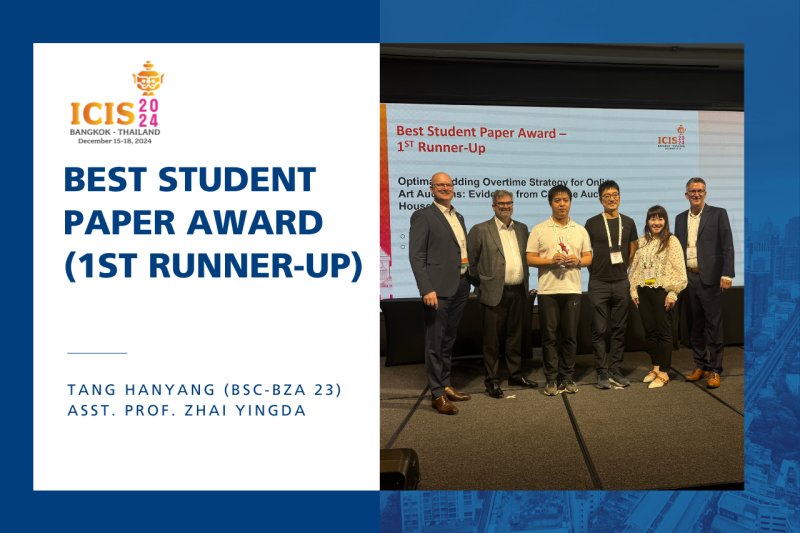
Best Student Paper Award at ICIS 2024
Congratulations to our alumnus Tang Hanyang (BSc BZA, Class of 2023) and his Final Year Project advisor, Assistant Professor Zhai Yingda, on winning 1st runner-up for the Best Student Paper Award at the 2024 International Conference on Information Systems (ICIS) in Bangkok, Thailand.
Their paper, "Optimal Bidding Overtime Strategy for Online Art Auctions: Evidence from Chinese Auction Houses", explores strategies in digital commerce, focusing on bidding behavior in online art auctions. The research was developed as part of Hanyang's Final Year Project and demonstrates impactful contributions to the field.
Hanyang is currently pursuing his MST and conducting research at the Urban Mobility Lab at MIT, where he continues to advance in data-driven research. We are proud to see his achievements and look forward to his future contributions.
#NUSComputing
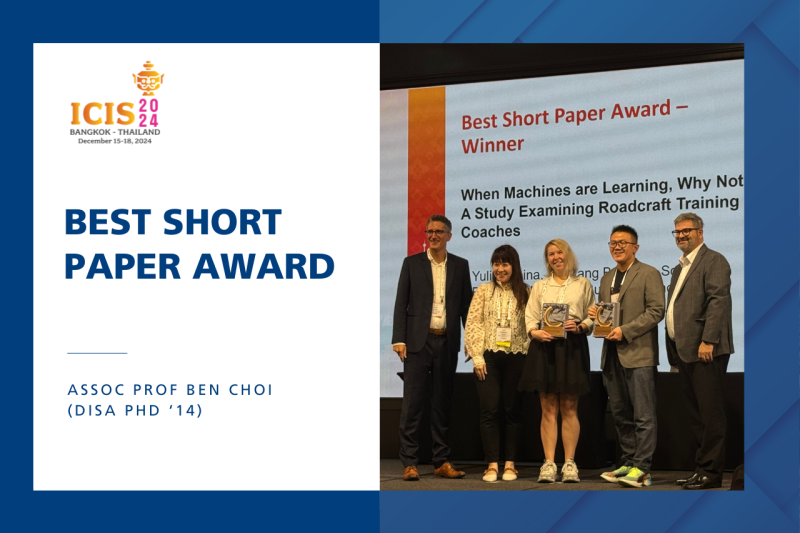
PhD Alumnus Ben Choi Wins Best Short Paper Award at ICIS 2024
Congratulations to our PhD alumnus Associate Professor Ben Choi (DISA PhD, Class of 2014) on winning the Best Short Paper Award at the 2024 International Conference on Information Systems (ICIS) in Bangkok, Thailand (Dec 15-18).
His paper, "When Machines are Learning, Why Not Humans? A Study Examining Roadcraft Training by AI Coaches", explores how AI systems can enhance human skill development and training. The study provides valuable insights into leveraging AI coaching to improve learning outcomes, bridging technology and education.
Currently an Associate Professor at Nanyang Business School, Ben continues to advance research in information systems, driving innovation and practical applications in the field. We are proud to celebrate his achievements and look forward to his continued impact.
#NUSComputing
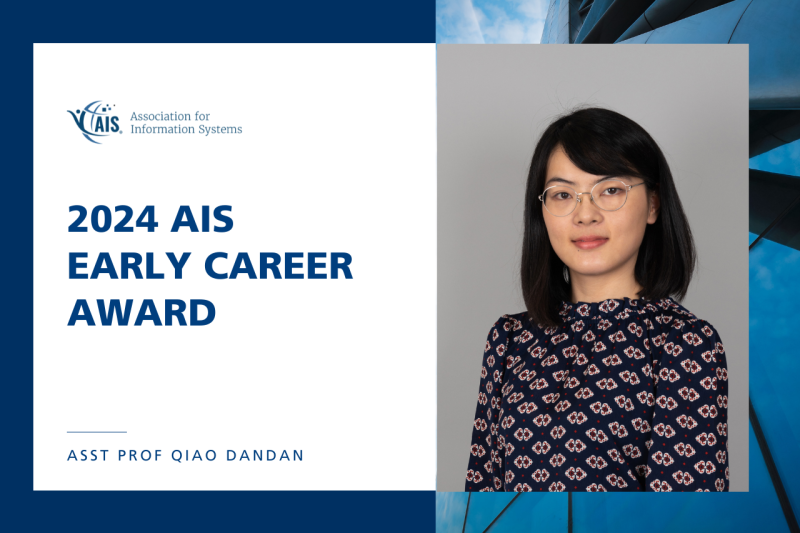
Assistant Professor Qiao Dandan Receives 2024 AIS Early Career Award
We are delighted to share that DISA Assistant Professor Qiao Dandan has been honored with the prestigious AIS Early Career Award!
This esteemed recognition celebrates Dr. Qiao’s outstanding contributions to research, teaching, and service in the field of Information Systems. Established in 2014, the AIS Early Career Award is presented to individuals who have made a significant and enduring impact early in their careers—a reflection of Dr. Qiao’s remarkable dedication, innovation, and excellence since joining NUS.
Dr. Qiao’s work continues to shape and inspire the Information Systems field, and this award underscores her commitment to advancing both academic research and practical applications. Her achievements in education and scholarship set a benchmark for future leaders in the discipline.
Congratulations to Dr. Qiao on this well-earned recognition! We are immensely proud of her success and look forward to her continued contributions to the field.
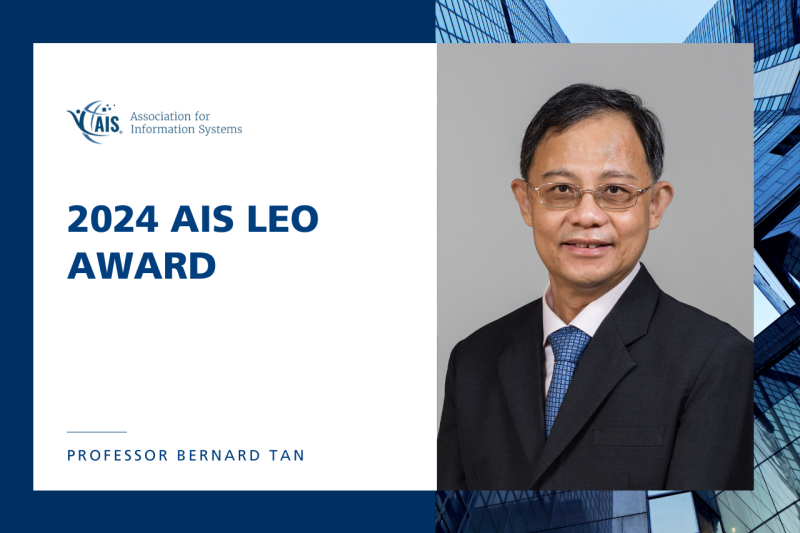
Professor Bernard Tan Receives 2024 AIS LEO Award
Congratulations to Tan Sri Runme Shaw Senior Professor and Senior Vice Provost (Undergraduate Education) Bernard C.Y. Tan on being selected to receive the prestigious AIS LEO Award! The award was presented at the 2024 International Conference on Information Systems in Bangkok, Thailand (December 15-18).
The LEO Award, named after one of the world’s first commercial applications of computing (the Lyons Electronic Office) is the most prestigious award conferred by the Association for Information Systems (AIS) for lifetime exceptional achievements in Information Systems. It recognizes outstanding academics for exceptional contributions to research in and practice of information systems.
We are proud to celebrate this incredible achievement of Professor Tan and look forward to his continued contributions to the field.
Congratulations to Professor Tan on this exceptional recognition!
-
Computing 1
13 Computing Drive
Singapore 117417
© National University of Singapore. All Rights Reserved. • Legal • Branding guidelines




